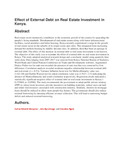| dc.contributor.author | Wanyama, Hutton Ndombi | |
| dc.contributor.author | Byaruhanga, John | |
| dc.contributor.author | Ngala, Consolata | |
| dc.date.accessioned | 2021-06-22T13:51:02Z | |
| dc.date.available | 2021-06-22T13:51:02Z | |
| dc.date.issued | 2020-08-11 | |
| dc.identifier.uri | 1https://doi.org/0.12691/jfe-8-4-4Open | |
| dc.identifier.uri | http://www.sciepub.com/JFE/abstract/12172 | |
| dc.identifier.uri | http://r-library.mmust.ac.ke/123456789/1718 | |
| dc.description.abstract | Real estate sector immensely contributes to the economic growth of the country by upgrading the people’s living standards. Development of real estate comes along with better infrastructural facilities, social amenities and better housing. Kenya recently experienced a surge in the growth of real estate sector in the suburbs of its major towns and cities. This emanated from increasing demand for modern housing by middle- income class. In addition, there has been an upsurge in external debt. The effect of this increase in external debt to real estate investment is not known. The objective of this study was to examine the effect of external debt on real estate investment in Kenya. The study adopted analytical research design and a stochastic model using quarterly time series data. Data ranging from 2007-2017 was sourced from Kenya National Bureau of Statistics, World Bank and United Nations Conference on Trade and Development websites. Augmented Dickey Fuller test for unit root revealed the presence of unit root that was corrected by first difference. Correlation analysis revealed moderate negative relationship between external debt and real estate (r = -0.51). Variance Inflation factor test for Multicollinearity value was (1.62<10) and Durbin Watson test for serial correlation value was (1.912 < 2.5) indicating the absence of Multicollinearity and serial correlation respectively. Regression results indicated a statistically significant negative effect of external debt on real estate investment in Kenya (- 0.155869, p< 0.0500). The study recommends the government to adopt public private strategy (PPP) to attract more investors, provide incentives on building materials, reduce taxes on land and other vital resources associated with construction industry. Similarly, Interest on mortgage loans should be reduced to allow more people buy homes. The government should also reduce external borrowing by ensuring efficient revenue collection. This will lead to narrowing budget deficit and reduced external borrowing | en_US |
| dc.language.iso | en | en_US |
| dc.publisher | Journal of Finance and Economics | en_US |
| dc.subject | Effect , External, Debt ,Real, Estate, Investment | en_US |
| dc.title | Effect of External Debt on Real Estate Investment in Kenya. | en_US |
| dc.type | Article | en_US |

